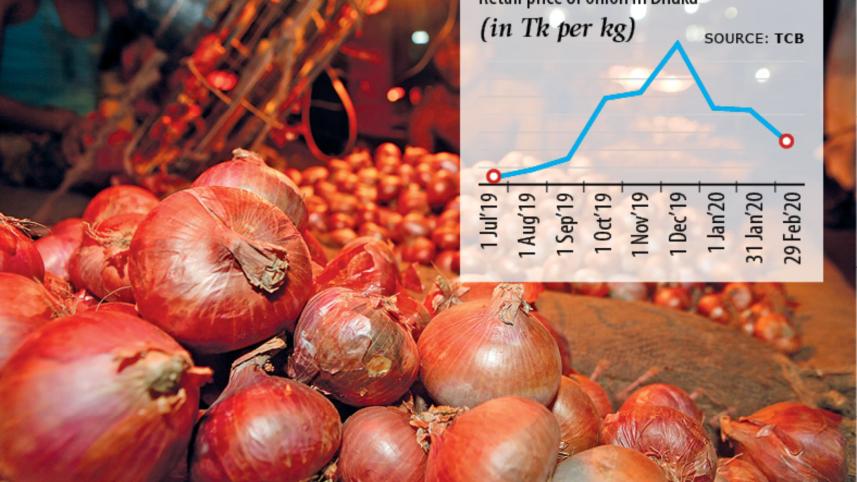Declining onion prices a double-edged sword

Onion prices have slumped amid increasing supply and fears of flooding of the bulb after India decided to lift the ban on export -- a development that has provided relief to consumers but raised concerns for farmers.
The prices of imported onions slumped 33 per cent to Tk 70 a kg at markets in Dhaka city yesterday, from Tk 105 a week ago.
The prices of locally grown varieties dropped 21 per cent during the week to Tk 75 per kg, according to market price data compiled by state-run Trading Corporation of Bangladesh.
The prices of the popular kitchen item also slid elsewhere in the country.
In Dinajpur, the price declined by as much as Tk 30 a kg, depending on quality and variety, said traders at two markets in the northwestern district town.
"It is really a big relief. Now we will be able to save," said Mukti Rani Saha, a resident in Mohammadpur in Dhaka.
Saha has stopped buying onions since she had to cough up Tk 230 for a kg after India's restriction rattled the market of the perishable item owing to lower domestic availability, speculative hoarding and low import.
In the past years, retail prices of the bulb usually hovered between Tk 20 and Tk 40 a kg.
Consumers elsewhere were also at ease as the price had skyrocketed to its highest yet to Tk 250 a kg in Dhaka after India slapped the ban on the shipment in September last year amid a dearth of domestic yield.
Bangladesh's annual onion production has remained steady at 17-18 lakh tonnes for four years through fiscal 2018-19 against the demand of 24 lakh tonnes.
The country imports 10-11 lakh tonnes of onion to plug the shortfall, which is also caused by post-harvest losses.
Rising arrivals of locally grown onions, imports from Myanmar and the news of the withdrawal of the export ban by India dampened the price, traders said.
"We are selling the imported onions at lesser prices to avoid losses," said Mazedur Rahman, a trader at a market in Dinajpur town.
If Indian onions enter the markets, there will be no demand for onion from Myanmar, he said.
India is yet to issue a notification on the removal of the export ban, said Dipankar Ghosh, organising secretary of the C&F Agents Association at Bhomra, one of the main onion importing ports from India, adding that the process to import will begin once the notification is issued.
Importers are taking preparation to open letters of credit to import onion from India, according to Harun Ur Rashid, president of the Import and Export Group at the Hili Land Port and chairman of Hakimpur upazila parishad.
Falling price is good news for consumers as they will not need to ration their consumption as they had to when the prices rose exorbitantly, said Shahanaz Begum Panna, who works at a private company.
"India's restriction has taught us a good lesson. We have to increase the local production and stand by our farmers to protect them from losses," she said.
Encouraged by the higher prices following India's ban, farmers cultivated onion on 2.34 lakh hectares of land this year, the highest in a decade and up 15 per cent year-on-year, according to preliminary estimates of the Department of Agricultural Extension.
But declining prices have already created worries among farmers.
Yesterday, locally grown onions were sold between Tk 1,400 and Tk 1,600 a maund at the markets in producing zones, down from more than Tk 2,500 a week ago, said Mohammad Aminul Islam, an onion trader in Pabna, one of the main onion producing districts.
"Prices should be between Tk 1,500 and Tk 2,000 each maund. Otherwise, farmers will suffer from losses," he said.
Farmers will have margins if they can sell onion at Tk 40-50 a kg, said Mohammad Abdul Mazed, general secretary of the Shyambazar Onion Wholesalers Association.
"We will write to the commerce ministry soon to discourage onion imports," Agriculture Secretary Md Nasiruzzaman told The Daily Star on Thursday over telephone.
The ministry will also write to the National Board of Revenue for imposing higher tariff on the import of agricultural produce.
Nasiruzzaman expects that farmers would produce 26 lakh tonnes of onion and the country might still need to import 5-7 lakh tonnes of the bulb during lean periods.
"If onions are not imported at all or are imported gradually, our farmers will get better prices and more land will come under onion cultivation next year."
But if there is huge import and prices drop to Tk 10-Tk 15 a kg, they will not grow onion next year, he added.

 For all latest news, follow The Daily Star's Google News channel.
For all latest news, follow The Daily Star's Google News channel.